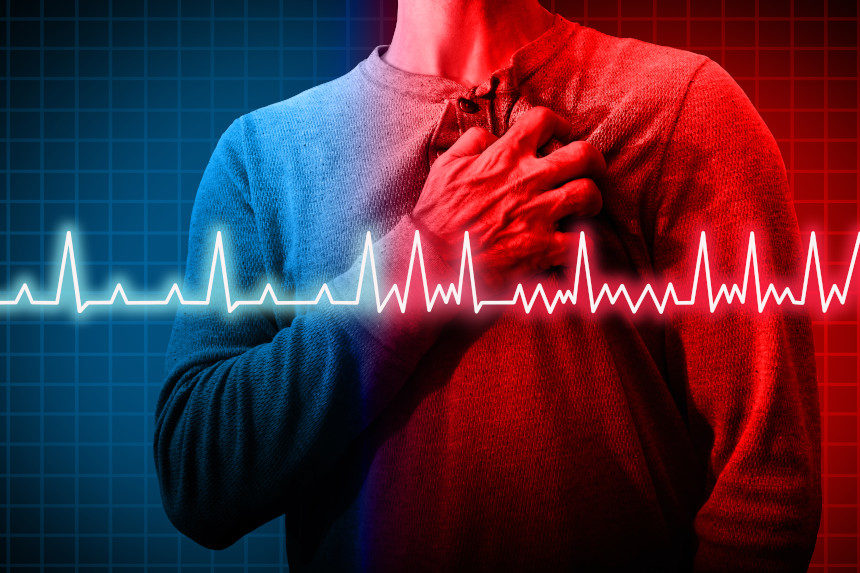“Your Health Checkup” is our online column by Dr. Douglas Zipes, an internationally acclaimed cardiologist, professor, author, inventor, and authority on pacing and electrophysiology. Dr. Zipes is also a contributor to The Saturday Evening Post print magazine. Subscribe to receive thoughtful articles, new fiction, health and wellness advice, and gems from our archive.
Order Dr. Zipes’ new book, Bear’s Promise, and check out his website http://www.dougzipes.com.
I experience an occasional palpitation that feels like a missed or extra heartbeat in my chest, or sometimes a hard thump. But that’s all: no dizziness, chest pain, or shortness of breath associated with them. Throughout my more than fifty years of practice as a cardiologist, that was the most common complaint my patients had. This week, even though I am no longer seeing patients, I played doctor again at my local fitness center — yes, I am once again exercising indoors, spaced, with masks (except during hard exercising), at a facility redesigned and specially ventilated, and more than two weeks after receiving my second dose of the Pfizer vaccine. A fellow exerciser asked me to feel his pulse after he had suddenly become short of breath and could no longer walk on the treadmill.
In contrast to an occasional palpitation, his pulse was about 150 beats per minute, totally irregular, and he was pale, sweaty, and breathing at about thirty times a minute, double the normal rate. The diagnosis was most probably atrial fibrillation, the most common sustained heart rhythm disorder, affecting over 5 million Americans — almost one in three adults older than 55 years.
AF is important because the rapid heart rate, if sustained, can lead to complications such as heart failure. Also, the rapidly beating top heart chambers (atria at 400+ beats per minute) can form blood clots that can cause a stroke. I told him to stop exercising and seek immediate medical help for evaluation and treatment. The good news is that, while AF is common, particularly in older folks, treatment by skilled medical professionals, usually a cardiologist, can either eliminate it or treat it to make it quite compatible with a normal life. I have had three short episodes spaced over a period of twenty years, so I know what it feels like, but it has not altered my life in any way.
Several types of AF exist, determined by how long it lasts and whether it stops spontaneously or can be terminated by drugs or an electrical shock. The reason for diagnosing different types is that the evaluation, therapy, and outcome differ. The paroxysmal type, which is AF having a spontaneous onset and termination, lasts several minutes to a week. Persistent AF lasts a week to years, while permanent AF continues unabated for a lifetime. In addition to drugs, one of the newer therapeutic choices is called ablation, during which a long wire is threaded into the heart to locate the abnormal area and burn or freeze it to restore the normal rhythm.
While AF is the most common kind of sustained rapid heart rhythm, multiple others exist. If you feel one of them, do not wait, but seek medical attention immediately. Prompt action could save your life.
Featured image: (Lightspring / Shutterstock)
Become a Saturday Evening Post member and enjoy unlimited access. Subscribe now




Comments
I have had paroxysmal AF for almost 11 years now. I have always gotten back to a normal rhythm with drugs or on my own. I have recently decided to have the ablation process in the hopes of ending the inconvenience of having the events and of taking the meds related to heart rhythm. After lengthy conversations with two cardio electrophysiologists, I have decided on the cryoablation (freezing) over the RF ablation (burning). All things considered, I felt this would be the better choice. Do you an opinion about which is the better of the two procedures?
I’ve experienced what you describe in the first paragraph, Dr. Zipes. Fortunately my heart is in excellent shape per checkups and physicals. It really SHOULD be considering all I do to keep myself healthy. I learned a long time ago to keep my electrolyte and magnesium levels up daily, along with plenty of water and a good multi-vitamin. Omega Q-plus softgels with resveratrol help too.
Looking fwd to learning much more about AF, from an expert!
Noel B.
Kent, Ohio